 Divine Interception
Divine Interception
Seven Dispensations of Man – The Dispensation of Human…
Join Me Live!
These teachings are conducted virtually on Wednesdays at 7:00pm Eastern Standard Time, United States.
Click the following link to register to join the RISE! eGroup live virtual class hosted by myself, Marilyn Moore.
Meet – RISE! Bible Study (google.com)
Seven Dispensations of Man – The Dispensation of Human Government
Time Period: From the Flood to the Tower of Babel.
Bible Books Covered: Genesis 8-11
People Focus: Descendants of Noah
God-Man Relationship:
Unified man is striving for self-government with the exclusion of divine guidance.
Highlighted Events:
-
Noahic Covenant
The Noahic Covenant is the promise to man and all living creatures that God will never again destroy the earth with a flood. He seals that promise with the rainbow as a sign (Genesis 9:8-13).
-
Ham Sinned – Canaan Cursed
Genesis 9:20-25 NIV
20 Noah, a man of the soil, proceeded to plant a vineyard.
21 When he drank some of its wine, he became drunk and lay uncovered inside his tent.
22 Ham, the father of Canaan, saw his father naked and told his two brothers outside.
23 But Shem and Japheth took a garment and laid it across their shoulders; then they walked in backward and covered their father’s naked body. Their faces were turned the other way so that they would not see their father naked.
24 When Noah awoke from his wine and found out what his youngest son had done to him,
25 he said,
“Cursed be Canaan!
The lowest of slaves
will he be to his brothers.”
I’ve Got Questions
- What did Ham do to Noah?
- If Ham did something wrong why was Canaan, Ham’s son, cursed?
Questions Answered
What did Ham do to Noah?
The answers to this question remain in scholarly debate. I will present briefly what is in circulation. Some of the explanations seem a bit outlandish but here we go.
View #1 – Ham castrated his father denying him a fourth son so Noah cursed Ham’s fourth son Canaan.
Ham’s motivation was that he didn’t want to divide the inheritance beyond the three sons Noah already had. Outlandish, right? This seems rather unreasonable in that they had the whole known earth to divide. There were no other living men to dispute their claims.
View #2 Ham sodomized Noah.
Research says this is possible because the phrase “saw the nakedness of his father” in Genesis 9:22 means more than what we understand today as seeing someone naked. Jewish scholars literate in Hebrew idioms consider the phrase a euphemism.
A euphemism is “a mild or indirect word or expression substituted for one considered to be too harsh or blunt when referring to something unpleasant or embarrassing.”
So, the phrase “saw the nakedness of his father” really means having sexual relations with him. We use similar euphemisms today for the same activity such as “he got with her”, “they are dating”, “spending the night”, etc.
View #3 Ham had relations with Noah’s wife.
This view is said to be supported by Leviticus 18:7-8 King James Version which says,
“You shall not uncover the nakedness of your father, which is the nakedness of your mother; she is your mother, you shall not uncover her nakedness. You shall not uncover the nakedness of your father’s wife; it is your father’s nakedness”.
Here the thought is the idiom “saw his father’s nakedness” was equivalent to having relations with his wife which is supported by the explanation in Leviticus.
Let’s look at the same verses in the New International Version,
Leviticus 18:7-8
7 “‘Do not dishonor your father by having sexual relations with your mother. She is your mother; do not have relations with her.
8 “‘Do not have sexual relations with your father’s wife; that would dishonor your father.
If this view is true his wife promptly told him what Ham had done.
Genesis 9:24
24 And Noah awoke from his wine, and knew what his younger son had done unto him.
View #4 Ham, when seeing his father naked, went out to tell others of his shame.
In this instance, Ham failed to protect his father’s integrity by covering him and keeping the incident private. Instead, he ran to tell his brothers so they too would see his shame.
Shem’s and Japheth’s Response
Genesis 9:23
23Shem and Japheth took the garment and placed it on their shoulders. Then they walked in backwards and covered up their father’s nakedness. Their faces were turned the other way so they did not see their father’s nakedness.
Those that support this view say Ham’s sin was gazing at his father’s nakedness and nothing more.
Ham’s Sin Conclusion
The jury is still out on exactly what Ham did. We do know it angered Noah enough to curse Canaan and his descendants. Although the least vile choice would be Ham not protecting his father’s integrity. However, the sexual implications proffered by Jewish scholars on the Hebrew text is not easily dismissed.
Why was Canaan cursed and not Ham?
When Noah awoke and knew what Ham had done, he cursed his son Canaan. If Ham was the offender, then the curse upon Canaan would be an injustice. Deuteronomy 24:16 says,
“Fathers shall not be put to death because of their children, nor shall children be put to death because of their fathers. Each one shall be put to death for his own sin”.
This scripture implies it would be wrong for Noah to inflict punishment on Canaan for Ham’s sin. However, it is not absolutely known if Noah regarded this practice during the time this happened.
View#1 Cannot Curse What God Has Blessed
The reason some believe Canaan was cursed was because God had already blessed Ham in Genesis 9:1.
“And God blessed Noah and his sons, and said unto them, Be fruitful, and multiply, and replenish the earth.”
Noah could not curse what God had already blessed much like Balaam the prophet could not curse Israel (Numbers 22:12; Numbers 23:20).
View #2 The Curse was a Prophetic Utterance
Canaan’s land inheritance was west of the Nile River in Africa. Against the will of his father Ham, and brothers, he chose to settle in a portion of the land inherited by Shem, the land west of the Jordan River in West Asia. Canaan was in defiance of the blessings of land inheritance. Additionally, Canaan’s sins described in Leviticus 18 seal their curse.
Leviticus 18:1-3 NIV
1The Lord said to Moses,
2 “Speak to the Israelites and say to them: ‘I am the Lord your God.
3 You must not do as they do in Egypt, where you used to live, and you must not do as they do in the land of Canaan, where I am bringing you. Do not follow their practices.
The scripture text goes on to speak of the practice of sexual relations within the immediate family nucleus. The Canaanites had become so engrafted in sin that God promises the land to Israel. So, the Canaanites are not only cursed to be servants of servants, they are stripped of their national identity. The curse was a revelation of what was to become of Canaan’s descendants.
-
Noah’s Bloodlines
Ham, Shem, Japheth
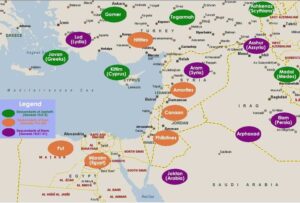
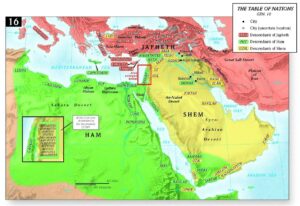
Ham
Sons –> Cush, Mizraim, Phut, Canaan
Descendants
Cush –> Ethiopians
Mizraim -> Egyptians
Phut -> Libyans
Canaan -> Phoenicians, Canaanites (Amorites, Girgasites, Jebusites, Hivites, Arvadites, etc)
Modern-Day Canaan
Currently Canaan is a combination of modern-day Israel, the West Bank, Gaza Strip, Jordan and southern portions of Syria and Lebanon.
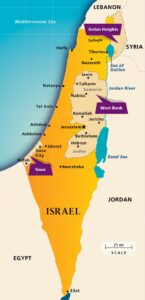
Shem
Sons -> Elam, Asshur, Arphaxad, Lud, Aram
Abraham -> Isaac and Ishmael Hebrews (Jews) and the Arabs (Muslims)
Descendants
Israel, Jordan, Lebanon, Palestine, Syria (Arameans), Assyria, Iran Iraq, most of Turkey, West Asians.
Japheth
Sons -> Gomer, Madai, Tubal, Tiras, Magog, Javan, Meshech
Descendants
People of the Aegean Sea, Turkey, Europeans
People Not Named in the Bible
Not all people were named in the Bible such as the Celtic, Slavic, Germanic, and Nordic, sub-Saharan Africans, Native Americans, Central Asia, the Indian subcontinent, the Far East, and Australasia (Australia, New Zealand and other islands). How did these nations of people come about?
Continental Migration
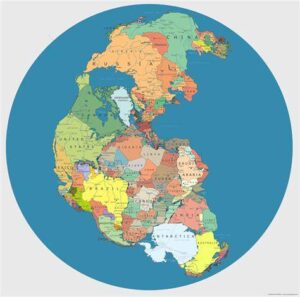
More than 200 million years ago, the continents were merged as one giant landmass called Pangaea (pronounced pan-g- ah).
As the population grew, it became necessary to migrate to uncharted territories. Pangaea eventually began separating during the Early Jurassic Epoch which separated the land and the people that lived in them. This explains the existence of indigenous people in continents other than Europe, Asia and Africa.
The Relationship Spoiler:
Self-government without God’s guidance.
Genesis 11:1-9 NIV
1 Now the whole world had one language and a common speech.
2 As people moved eastward, they found a plain in Shinar [Babylonia] and settled there.
3 They said to each other, “Come, let’s make bricks and bake them thoroughly.” They used brick instead of stone, and tar for mortar.
4 Then they said, “Come, let us build ourselves a city, with a tower that reaches to the heavens, so that we may make a name for ourselves; otherwise we will be scattered over the face of the whole earth.”
5 But the Lord came down to see the city and the tower the people were building.
6 The Lord said, “If as one people speaking the same language they have begun to do this, then nothing they plan to do will be impossible for them.
7 Come, let us go down and confuse their language so they will not understand each other.”
8 So the Lord scattered them from there over all the earth, and they stopped building the city.
9 That is why it was called Babel—because there the Lord confused the language of the whole world. From there the Lord scattered them over the face of the whole earth.
By centralizing around the tower of Babel, people chose to disregard God’s command to replenish the earth (Genesis 9:1).
God had another centralization problem in the New Testament when Jesus told his disciples to spread the gospel “to the ends of the earth” (Acts 1:8). Instead, the disciples decided to stay in Jerusalem. God sent persecution to scatter them to accomplish what they could have on their own had they been obedient.
Men wanted to build the Tower of Babel in the hope of finding security within themselves and through the works of their hands. They chose to forgo the security that comes from trusting and obeying God.
They chose to make a “name” for themselves establishing their own government. It is evident that unification is a powerful force because God said “nothing will be restrained”(prevented) from them which they imagine to do” (verse 6).
It was the same spirit that consumed Lucifer in Heaven when he desired the throne of God. Lucifer convinces one-third of the angels to “speak his language” believing they were deserving of and could obtain independence from God.
These descendants of Noah all had one language and began believing they had sufficient knowledge among themselves to govern themselves.
The Judgement:
Languages were confused and they scattered. This scattering confounded Satan’s plan to have man unify in rebellion against God. They could no longer understand each other. Satan’s plan to use all of mankind against God was thwarted.
The Work of Man’s Hands
The Tower of Babel represented ‘the work of man’s hands’ and man’s effort to invent their own way to lofty heights.
Some are guilty of the same today. There are those that have deselected God’s script for achieving heaven and have manufactured many alternate routes to heaven.
One Way
There’s only one way to heaven. And that’s by faith in Jesus Christ. Jacob’s ladder, Genesis 28:12-17, represents the spiritual staircase to heaven in that it directs our minds and hearts to the promise of heaven but not a way to get there by the work of our hands. Salvation is not of works but it is through grace by faith (Ephesians 2:8).
Must Watch the Following Video
Isis Leader Video
Summary:
The Tower of Babel reveals the nature of man and his broken relationship with God. Human nature struggles to be unified in opposition to God. Romans chapter 1 speaks of man worshipping the creature more than the Creator. It is idolatry. God’s judgment is to give them over to a reprobate (unprincipled) mind. In this particular dispensation, God scatters them.
Next: The Dispensation of Promise
References
Ham (son of Noah) – Wikipedia Retrieved 6/10/23
Why did Noah curse Ham / Canaan? | GotQuestions.org Retrieved on 6/10/23
Generations of Noah – Wikipedia
At the Tower of Babel, why did God change the peoples languages? (bibleask.org)
Why does God scatter the people in Genesis 11? – Biblical Hermeneutics Stack Exchange
Why does God scatter the people in Genesis 11? – Biblical Hermeneutics Stack Exchange





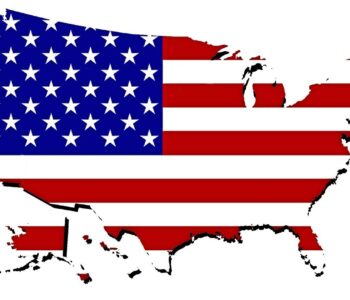
5 COMMENTS
Once I originally commented I clicked the -Notify me when new feedback are added- checkbox and now every time a remark is added I get four emails with the identical comment. Is there any manner you’ll be able to take away me from that service? Thanks!
I’ve already checked into this for others and I can’t do anything on my side. Sorry.
I’ve checked into this already and I cannot do anything on my side. Sorry.
This is really attention-grabbing, You are an overly professional blogger. I’ve joined your feed and stay up for searching for extra of your great post. Additionally, I’ve shared your web site in my social networks!
I am often to blogging and i really appreciate your content. The article has really peaks my interest. I am going to bookmark your site and keep checking for new information.